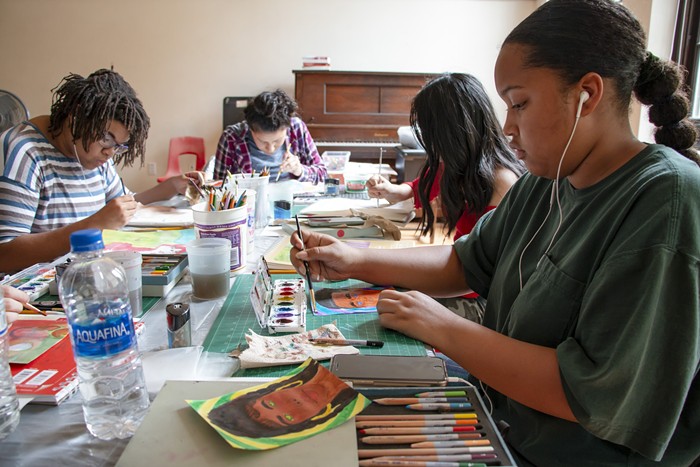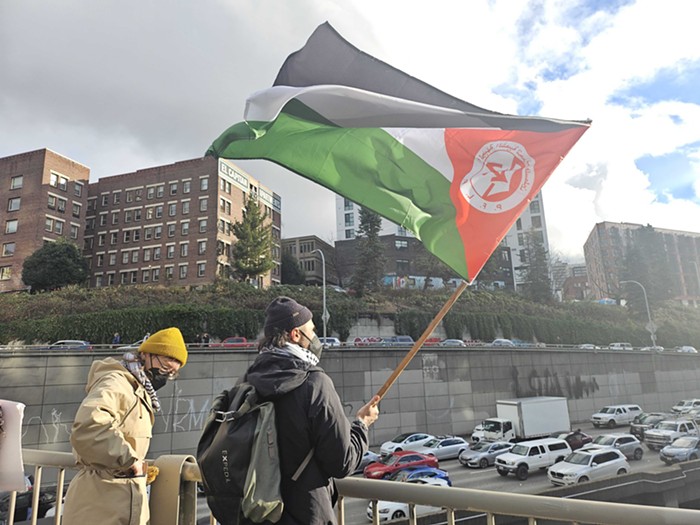On November 7, the Seattle Office of Planning and Community Development (OPCD) released its findings from the public engagement process for the first phase of the 2024 Seattle Comprehensive Plan update, which is a big roadmap that will guide the way the city grows over the next decade.
Since then, the OPCD has presented these findings in multiple arenas, including at a Seattle City Council hearing on November 30. During this first phase of the process, the OPCD set up an online engagement hub, where people could comment on and upvote or downvote different alternative plans for how Seattle will grow.
Through a collaborative process with community organizations and those impacted most directly by the housing crisis, Real Change submitted an alternative plan of our own. Conversations with communities such as Real Change vendors and Puget Sound Sage informed the comment.
Our plan, Alternative 6: Social Communities for All, called for ensuring affordable social housing for all, allowing for 6- to 8-story apartment buildings to be used as social housing in all neighborhoods, and a “15-minute city” with social housing built within half a mile of all current and future parks, light rail stations, and transit hubs.
Through prioritizing social housing—a model of housing used throughout the world with a proven track record of creating more affordable and equitable cities—Alternative 6 positioned the OPCD to reduce segregation in Seattle, promote outdoor activity for all residents regardless of income level, and create a more accessible city for everyone.
Despite receiving the most upvotes (428) and the most engagement of any of the comments on the OPCD engagement hub, we believe that in summarizing its findings, the OPCD has deliberately omitted one of the key takeaways from our plan: the need to build social housing throughout Seattle.
This is because the concept of social housing requires massive increases to zoning capacity across all neighborhoods in Seattle, surpassing the City’s current urban village strategy, which isolates dense development to small portions of the city. While this is the necessary and moral thing to do, it is not politically popular among the city’s large, single-family-home-owning population. But we must zone for social housing in order to make this a city for all, push back against our history of racist redlining, and have a plan that centers our environment.
The OPCD’s report and presentations make no mention of social housing whatsoever—a glaring omission that erases our input along with that of hundreds of residents in the Greater Seattle area. Indeed, an analysis of the public comments submitted to the OPCD shows that a whopping “10% of all online engagement hub comments and emails express explicit support for social housing (97 comments on the online engagement hub and 10 emails). Additionally, comments supporting social housing on the online engagement hub garnered 2,928 upvotes (18% of all upvotes) and 2,003 net votes (15% of all net votes).”
Aside from public comment, the I-135 campaign educated Seattle voters about social housing over six months (and continues to do so), and also gathered more than 27,000 signatures to put social housing on the Seattle ballot in February of 2023.
Given these significant shows of support, ignoring calls for social housing reads as a blatant abuse of power by the OPCD, and it sends a clear signal to all those who engaged with the comprehensive plan that their input does not count.
Rather than acknowledging the significant support for social housing, the OPCD has inaccurately painted Alternative 6 as a call for “allowing more high-rise towers in existing urban centers and villages,” among other incorrect or incomplete representations.
It is clear, however, that Alternative 6 with social housing in all neighborhoods represents a loud community voice outrightly rejecting this "Urban Village Strategy," which concentrates growth and the ability to build social housing in small parts of the city outside wide swaths of exclusive, detached single-family home neighborhoods. (Although some commenters supporting Alternative 6 did ask for more towers, they wanted to see this type of construction occur throughout the city. In particular, 36 out of 38 [95%] comments mentioning high-rises call for allowing mid- or high-rises across the entire city, not just in urban villages.) The OPCD itself has even studied the issue and admitted that “the Urban Village Strategy perpetuates a historical pattern of exclusion and increases displacement pressures on communities of color.”
The OPCD’s unwillingness to acknowledge community calls for social housing everywhere reflects a lack of courage on their part to make bold and necessary changes that will truly begin to address our housing crisis. This lack of courage coupled with a lack of imagination for transformative public solutions cause the agency and its leaders to push forth incremental fixes that will not be able to meet the scale of our challenges, such as minor increased height allowances for adding affordable homes to a new building, suggested during the OPCD’s November 30 presentation.
The omission of community calls for social housing also reflects the OPCD’s bias in favor of the status quo and those already in power. For example, while ignoring resounding calls for social housing, the OPCD devotes an entire sentence in its public engagement findings report to an explanation of Council Member Alex Pedersen’s lone, obstructionist request for an alternative “L” that would severely limit new construction in single-family home neighborhoods. During its November 30 presentation, the OPCD also championed the viewpoints of wealthy, mostly white homeowners in single-family home neighborhoods when it supported the harmful idea that growth must be tempered and balanced with the need to preserve the “architectural character” of exclusive neighborhoods.
We absolutely cannot build the city we want and deserve with the current OPCD proposals and fake calls for community input. In a democracy, input from the people must be considered. When there is significant support for a policy, that cannot and should not be dismissed by those in power. The people have spoken, and we aren’t just asking for the same current offerings of affordable housing. What we want and need is new social housing across the entire city. The OPCD, the City Council, and Mayor must acknowledge our voices.
Shirley Leung, a water and climate scientist, is a Share the Cities Organizing Collective volunteer.
Camille Gix is a graduate student of policy at University of Washington and a member of the I-135 steering committee.
Tiffani McCoy is the advocacy director at Real Change and a co-chair for I-135.
James Wu, a data scientist, is a Share the Cities Organizing Collective volunteer.



















